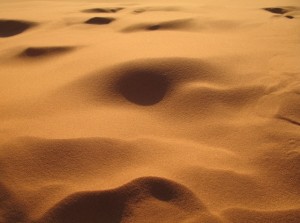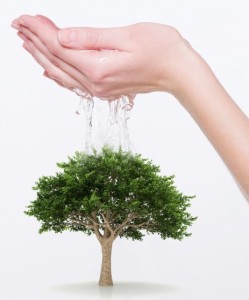Wintertime Skincare Basics: Hydration
Replenish Thirsty Skin from the Inside Out
In wintertime, consistent attention to both internal and external hydration should become one of your top skincare priorities.
Is Your Dry Wintertime Skin Telling You Something?
The parched, prickly skin of winter is more than a cosmetic problem. Crusty cracked lips; sunken eye sockets; or shriveled, papery skin are often the first visible warning signs of dehydration. Once our body loses 2% its fluids, the ensuing symptoms--dizziness, fatigue, muscle weakness, headaches, and general malaise--cause most of us to reach for aspirin, antibiotics, or heavy-duty cold medicines. Why don't we just pour ourselves a big glass of water instead?
 The answer lies in the complex interplay between our wintertime environment and our body's physiological responses to its extremes of temperature and humidity.
Dehydration: A Sneak Attack on Your Body's Defenses
Whether we're trudging through a snowstorm, sipping hot cocoa by the fireplace, or working up a sweat downhill skiing, the shifting environmental extremes we experience at this time of year not only deplete our bodies of water, but also impair the ability of our organs to keep fluid levels in balance.
The answer lies in the complex interplay between our wintertime environment and our body's physiological responses to its extremes of temperature and humidity.
Dehydration: A Sneak Attack on Your Body's Defenses
Whether we're trudging through a snowstorm, sipping hot cocoa by the fireplace, or working up a sweat downhill skiing, the shifting environmental extremes we experience at this time of year not only deplete our bodies of water, but also impair the ability of our organs to keep fluid levels in balance.
 A Vicious Natural Cycle
While the heat and low humidity indoors tends to leach water from the outer layers of our skin, the cold, dry air outside robs moisture from the mucosal tissues in our mouths, throats, and lungs. The stress of frigid temperatures also raises our blood pressure, which in turn causes the kidneys to overproduce urine, prompting repeated trips to the bathroom that further diminish the volume of vital bodily fluids. To make matters still worse, cold weather tends to depress the brain functions that signal thirst.
For older adults, the risk of dehydration is even greater. Aging not only further weakens the brain's thirst signals, but also decreases the amount of water in our tissues as well as our kidney's ability to regulate fluid volume and concentration.
Water: Nature's Perfect Health Tonic
Plain old-fashioned water remains the best internal hydrator around. But that doesn't stop the mainstream health and beauty industry from trying to convince consumers to waste money on their new and "improved" varieties.
Internal Hydration: Why Simpler Is Better
Leading health experts agree that vitamin-enriched waters not only fail to improve on Mother Nature's version, but also frequently contain refined sugars or artificial sweeteners, dyes, and other risky chemicals. As for the special blend of skin-balancing nutrients in the latest "cosmeceutical" drinks--a quick check of the label reveals the truth: The synthetic antioxidants and vitamins they contain are the same ones in cheap chemical supplements.
As far as I know, 21st century bioengineering has yet to invent a better hydration method than the prescription handed down across generations: Drink 8 glasses of water and eat plenty of fruit every day.External Hydration: Keep It Natural
Why are aloe vera, hyaluronic acid, honey, vegetable glycerin, and other natural humectants a better choice than synthetic moisturizers? The two main advantages of these organic substances are absolutely fundamental to total skin health: (1) safety (2) effectiveness.
A Vicious Natural Cycle
While the heat and low humidity indoors tends to leach water from the outer layers of our skin, the cold, dry air outside robs moisture from the mucosal tissues in our mouths, throats, and lungs. The stress of frigid temperatures also raises our blood pressure, which in turn causes the kidneys to overproduce urine, prompting repeated trips to the bathroom that further diminish the volume of vital bodily fluids. To make matters still worse, cold weather tends to depress the brain functions that signal thirst.
For older adults, the risk of dehydration is even greater. Aging not only further weakens the brain's thirst signals, but also decreases the amount of water in our tissues as well as our kidney's ability to regulate fluid volume and concentration.
Water: Nature's Perfect Health Tonic
Plain old-fashioned water remains the best internal hydrator around. But that doesn't stop the mainstream health and beauty industry from trying to convince consumers to waste money on their new and "improved" varieties.
Internal Hydration: Why Simpler Is Better
Leading health experts agree that vitamin-enriched waters not only fail to improve on Mother Nature's version, but also frequently contain refined sugars or artificial sweeteners, dyes, and other risky chemicals. As for the special blend of skin-balancing nutrients in the latest "cosmeceutical" drinks--a quick check of the label reveals the truth: The synthetic antioxidants and vitamins they contain are the same ones in cheap chemical supplements.
As far as I know, 21st century bioengineering has yet to invent a better hydration method than the prescription handed down across generations: Drink 8 glasses of water and eat plenty of fruit every day.External Hydration: Keep It Natural
Why are aloe vera, hyaluronic acid, honey, vegetable glycerin, and other natural humectants a better choice than synthetic moisturizers? The two main advantages of these organic substances are absolutely fundamental to total skin health: (1) safety (2) effectiveness.
 Plant-derived humectants are less likely to cause irritation or allergies because their composition closely resembles the natural moisturizing factors (NMFs) in human skin. As a result, our skin cells readily absorb botanical humectants. In addition to hydrating the skin surface, these natural moisture magnets also support cellular functioning and repair with a healthy dose of anti-aging phytonutrients.
For more information about the anti-aging benefits of natural humectants read my October 2010 0n noninvasive wrinkle treatments.
Plant-derived humectants are less likely to cause irritation or allergies because their composition closely resembles the natural moisturizing factors (NMFs) in human skin. As a result, our skin cells readily absorb botanical humectants. In addition to hydrating the skin surface, these natural moisture magnets also support cellular functioning and repair with a healthy dose of anti-aging phytonutrients.
For more information about the anti-aging benefits of natural humectants read my October 2010 0n noninvasive wrinkle treatments.
